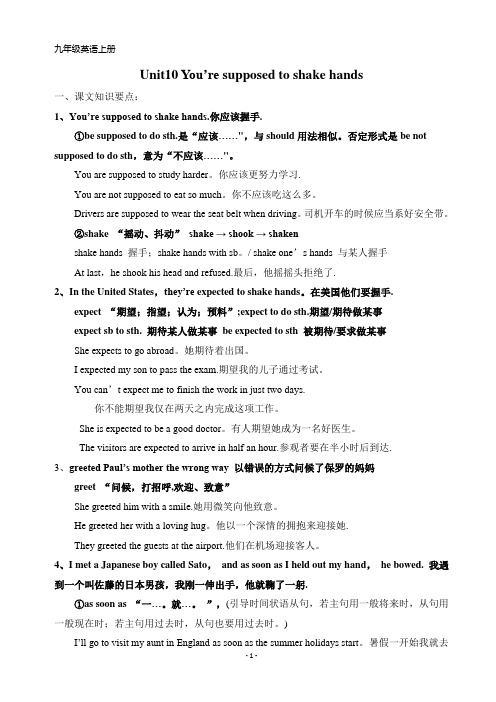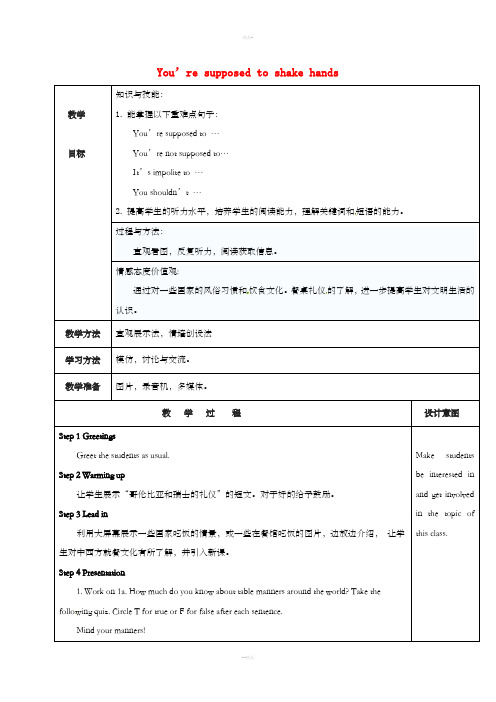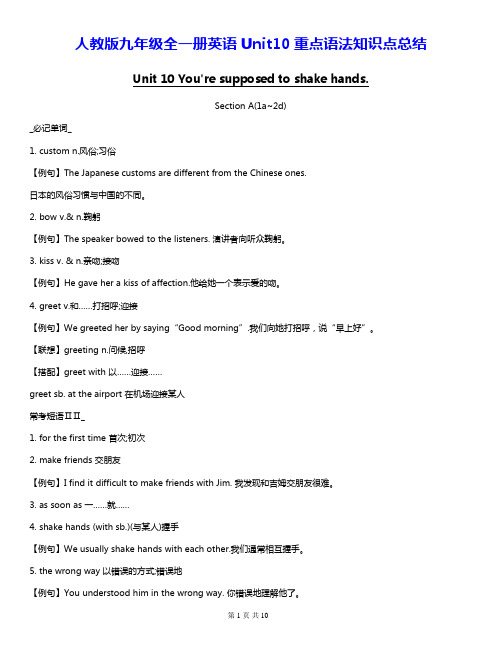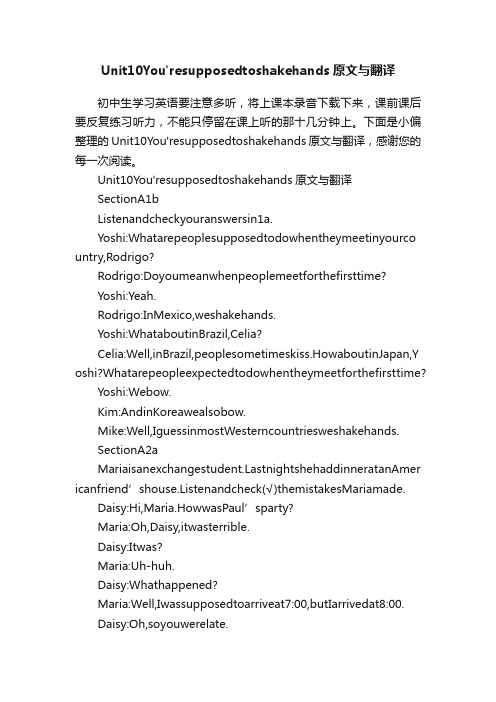九年级英语全册Unit10You’resupposedtoshakehandsSectionB1(1a_2e)教案(新版)人教新目标版
九年级英语上册unit10知识要点

九年级英语上册Unit10 You’re supposed to shake hands一、课文知识要点:1、You’re supposed to shake hands.你应该握手.①be supposed to do sth.是“应该……",与should用法相似。
否定形式是be not supposed to do sth,意为“不应该……"。
You are supposed to study harder。
你应该更努力学习.You are not supposed to eat so much。
你不应该吃这么多。
Drivers are supposed to wear the seat belt when driving。
司机开车的时候应当系好安全带。
②shake “摇动、抖动”shake → shook → shakenshake hands 握手;shake hands with sb。
/ shake one’s hands 与某人握手At last,he shook his head and refused.最后,他摇摇头拒绝了.2、In the United States,they’re expected to shake hands。
在美国他们要握手.expect “期望;指望;认为;预料”;expect to do sth.期望/期待做某事expect sb to sth. 期待某人做某事be expected to sth 被期待/要求做某事She expects to go abroad。
她期待着出国。
I expected my son to pass the exam.期望我的儿子通过考试。
You can’t expect me to finish the work in just two days.你不能期望我仅在两天之内完成这项工作。
She is expected to be a good doctor。
九年级英语全册 Unit 10 You’re supposed to shake hands Sec

You’re supposed to shake hands教学目标知识与技能:1.能掌握以下重难点句子:You’re supposed to …You’re not supposed to…It’s impolite to …You shouldn’t …2.提高学生的听力水平,培养学生的阅读能力,理解关键词和短语的能力。
过程与方法:直观看图,反复听力,阅读获取信息。
情感态度价值观:通过对一些国家的风俗习惯和饮食文化。
餐桌礼仪的了解,进一步提高学生对文明生活的认识。
教学方法直观展示法,情境创设法学习方法模仿,讨论与交流。
教学准备图片,录音机,多媒体。
教学过程设计意图Step 1 GreetingsGreet the students as usual.Step 2 Warming up让学生展示“哥伦比亚和瑞士的礼仪”的短文。
对于好的给予鼓励。
Step 3 Lead in利用大屏幕展示一些国家吃饭的情景,或一些在餐馆吃饭的图片,边放边介绍,让学生对中西方就餐文化有所了解,并引入新课。
Step 4 Presentation1. Work on 1a. How much do you know about table manners around the world? Take the following quiz. Circle T for true or F for false after each sentence.Mind your manners!Make students be interested in and get involved in the topic of this class.1. In India, you’re supposed to eat with your hands. T F2. In China, you’re not supposed to stick your chopsticks into the food. T F3. In Korea, the youngest person is expected to start eating first. T F4. In France, you’re supposed to put your bread on the table. T F5. In China, it’s impolite to use your chopsticks to hit an empty bowl. T F1)先让学生自己做,老师指导,让他们理解每个句子的意思。
人教版九年级全一册英语Unit10重点语法知识点总结

人教版九年级全一册英语Unit10重点语法知识点总结Unit 10 You're supposed to shake hands.Section A(1a~2d)_必记单词_1. custom n.风俗;习俗【例句】The Japanese customs are different from the Chinese ones.日本的风俗习惯与中国的不同。
2. bow v.& n.鞠躬【例句】The speaker bowed to the listeners. 演讲者向听众鞠躬。
3. kiss v. & n.亲吻;接吻【例句】He gave her a kiss of affection.他给她一个表示爱的吻。
4. greet v.和……打招呼;迎接【例句】We greeted her by saying“Good morning”.我们向她打招呼,说“早上好”。
【联想】greeting n.问候,招呼【搭配】greet with 以……迎接……greet sb. at the airport 在机场迎接某人常考短语ⅡⅡ_1. for the first time 首次;初次2. make friends 交朋友【例句】I find it difficult to make friends with Jim. 我发现和吉姆交朋友很难。
3. as soon as 一……就……4. shake hands (with sb.)(与某人)握手【例句】We usually shake hands with each other.我们通常相互握手。
5. the wrong way 以错误的方式;错误地【例句】You understood him in the wrong way. 你错误地理解他了。
6. hold out 伸出(手等)7. greet each other 互相问候8. to one’s surprise 令某人惊讶的是经典句型ⅢⅡ1. That's how people in Japan are expected to greet each other.那就是在日本人们互相问候的方式。
人教版初中英语九年级全册Unit 10 You’re supposed to shake hands

10-(9)了解并跨文化交际(恰当使用)。
四、情感态度
11.乐于参与英语活动,敢于用英语表达,积极与他人合作,体验自己的学习效果。
备教学
重、难点
内容
课标具体知识、技能、文化目标
知识与技能、文化意识的重、难点内容
课标具体策略目标选择
section A
section B
目标1
教学目标5(文化意识目标)
能恰当运用1 What are people in Korea supposed to do?
2when they meet for the first?When were you supposed to arrive?
3 I was supposed to arrive at 7:00.
7.每天课外阅读量最少达到750词。
(四)写
8.能运用…..词汇和…..语言形式以及参照范例(文章结构)简单描述人物或事件等,包括起草和修改。
二、文化意识
9.了解语言和语用的文化因素,体验跨文化交际。
三、学习策略
10-(1)利用读音规则和音标拼读词汇,利用上下文、非语言信息等理解词义,联想学习和记忆词汇,构词法等。
活动二1b
一、活动目标
80%学生能够听懂1b的对话,获取“who”信息;80%学生能够利用预测、语调、重音、问题等来获取听力信息。(达成目标2中的1b目标)
二、活动程序、策略及评价
1.构建听力动场:
布置任务:Listen and check your answers in 1a完成表格,然后自我评价。
80%学生能够利用读音规则和音标拼读词汇,利用语境、非语言信息等理解以上目标要求。
九年级英语Unit10You’resupposedtoshakehands.课文重难点知识点详细讲解[1]解读
![九年级英语Unit10You’resupposedtoshakehands.课文重难点知识点详细讲解[1]解读](https://img.taocdn.com/s3/m/6ec6289ed4d8d15abe234ee6.png)
Unit10 You’re supposed to shake hands.Section A1.In your country, what are you supposed to do when you meet someone for the first time?在你们国家,当你第一次见到某人的时候你应该做什么?【解析】be supposed to do sth 被期望做某事,应该做......1)当主语是人时,表示劝告、建议、责任等,=should =“to be expected to do sth,You are supposed to___________( arrive) on time2)当主语是物时,表示“本应;本该”The train was supposed to arrive half an hour ago.【拓展】:be supposed to 与should(1)be supposed是suppose一词的___________ 语态结构。
后接动词不定式,相当于___________ .后接不定式.即:_______________ . 使用较随便,建议性强否定式为be not supposed to do sth.()To keep safe, drivers aren’t supposed to drink before driving.A. aren’t willing toB. shouldn’tC. aren’t sure toD. don’t have to(2)should后接动词______ ,属于_______ 语态形式,使用起来较严肃和正式;You are not supposed to shake hands. = You shouldn’t shake hands.你不应与之握手。
【2012贵州贵阳】“Henry, you ______ tell the teacher if you want to go out of the classroom.”“Sorry, sir.”A. are supposed toB. are surprised toC. are afraid to【2013山东菏泽】8. You are _____to type quickly when talking to each other on QQ so the other person doesn't get bored A. suggested B. supportedC. taughtD. Supposed【2013黑龙江绥化】29. You are supposed to ________ smoking, ________ you will get ill.A. go on; soB. give up; or C stop; so【2014黔西南州】27. The students ought to wear school uniforms when they’re at school.A. are supposed toB. are allowed toC. would like toD. love to 【2014云南昆明】29. We are supposed to ___________a solution to stop people from looking down at their mobile phones while driving cars.A. come up withB. come formC. come outD. come true 【解析2】for the first time 首先,第一次【辨析】at first/first of all(1) at first = at the beginning 最初,开始【强调在时间顺序或做某事过程等开始之初】(2) first of all 首先,第一【表明陈述事情的重要性】( ) When you want to work for our country in the future, ____, we should have strong body and rich knowledge.A. at firstB. first of allC. for the first timeD. after all【山东德州】We can do a lot to stay healthy. ____ , we should eat a balanced(平衡的) diet.A. At a timeB. In factC. First of allD. All together【有关time的短语】A. firstB. oneC. onceD. firstly【2014贵州六盘水】24. Children always have a good time at the Wetland Park(湿地公园) of Liu Panshui.A. enjoy themselvesB. help each otherC. look beautifulD. have a big dinner()② People in China ________when they meet for the first time.A. bowB. kissC. shake handsD. laugh【新疆】You’re supposed to shake ______ (hand) when you meet your friends.( ) ②—Do you think our football team will win the match? —Yes, we have better players. so I ___them to win.A. hopeB. askC. helpD. expect【2013山东青岛】14. — You look sad. What has happened? —Everyone ______ us to win the match, but we lost.A. expectsB. expectedC. hopesD. Hoped【2013 湖北黄冈】30. Speak slowly, Mr. Wang. I can’t follow you.D. expect希望全班同学参加讨论。
Unit10Youresupposedtoshakehands原文与翻译

Unit10You'resupposedtoshakehands原文与翻译初中生学习英语要注意多听,将上课本录音下载下来,课前课后要反复练习听力,不能只停留在课上听的那十几分钟上。
下面是小偏整理的Unit10You'resupposedtoshakehands原文与翻译,感谢您的每一次阅读。
Unit10You'resupposedtoshakehands原文与翻译SectionA1bListenandcheckyouranswersin1a.Yoshi:Whatarepeoplesupposedtodowhentheymeetinyourco untry,Rodrigo?Rodrigo:Doyoumeanwhenpeoplemeetforthefirsttime?Yoshi:Yeah.Rodrigo:InMexico,weshakehands.Yoshi:WhataboutinBrazil,Celia?Celia:Well,inBrazil,peoplesometimeskiss.HowaboutinJapan,Y oshi?Whatarepeopleexpectedtodowhentheymeetforthefirsttime?Yoshi:Webow.Kim:AndinKoreawealsobow.Mike:Well,IguessinmostWesterncountriesweshakehands.SectionA2astnightshehaddinneratanAmer icanfriend’shouse.Listenandcheck(√)themistakesMariamade.Daisy:Hi,Maria.HowwasPaul’sparty?Maria:Oh,Daisy,itwasterrible.Daisy:Itwas?Maria:Uh-huh.Daisy:Whathappened?Maria:Well,Iwassupposedtoarriveat7:00,butIarrivedat8:00.Daisy:Oh,soyouwerelate.Maria:Yeah,butinmycountry,it’sdifferent.Whenyou’reinvit edfor7:00,you’reexpectedtocomelater!It’sconsideredstranget oturnupontime.Daisy:Isee.Maria:ThenwhenImetPaul’smom,Ikissedher.Daisy:Oh…youweresupposedtoshakehandsinstead.Maria:That’sright.AndIworeafanc ydress.Daisy:What’swrongwiththat?Maria:Well,itturnedoutthatitwasanoutdoorparty,Daisy.Every oneelsewasinaT-shirtandjeans.Daisy:Iguessnexttimeyoushouldaskwhatyou’resupposedto wear.SectionA2bListenagain.Fillintheblanks.Daisy:Hi,Maria.HowwasPaul’sparty?Maria:Oh,Daisy,itwasterrible.Daisy:Itwas?Maria:Uh-huh.Daisy:Whathappened?Maria:Well,Iwassupposedtoarriveat7:00,butIarrivedat8:00.Daisy:Oh,soyouwerelate.Maria:Yeah,butinmycountry,it’sdifferent.Whenyou’reinvit edfor7:00,you’reexpectedtocomelater!It’sconsi deredstranget oturnupontime.Daisy:Isee.Maria:ThenwhenImetPaul’smom,Ikissedher.Daisy:Oh…youweresupposedtoshakehandsinstead.Maria:That’sright.AndIworeafancydress.Daisy:What’swrongwiththat?Maria:Well,itturnedoutthatitwasanoutdoorparty,Daisy.EveryoneelsewasinaT-shirtandjeans.Daisy:Iguessnexttimeyoushouldaskwhatyou’resupposedto wear.SectionA2dRoleplaytheconversation.Howwasthewelcomepartyforforeignstudentslastnight?Great!Imadesomenewfriends.Butafunnythinghappened.What?ImetaJapaneseboycalledSato,andassoonasIheldoutmyhand, hebowed.That'showpeopleinJapanareexpectedtogreeteachother.It'sim politeifyoudon'tbow.Ididn'tknowthat.SoIjuststoodtherewithmyhandout.Finally,Ire turnedthebow.IrememberwhenlfirstmetMarielastyear,Ididthesamething.Ihe ldoutmyhandandtomysurprise,shekissedmeonbothsidesofmyfac e!Iwouldn'tmindthat!terlfoundoutFrenchpeoplearesupposedtokissw hentheyseeeachother.SectionA3aReadthefollowingopinionsofaColombianandaSwissstudent.I nwhichcountryisitOKtobe15minuteslatefordinner?TeresaLopezCall.ColomblaWhereI’mfrom,we’reprettyrelaxedabouttime.Wedon’tlik etorusharound,sowedon’tmindifpeoplearealittlelatesometimes.Ifyoutellafriendyou’regoingtotheirhousefordinner,it’sOKif youarriveabitlate.Weliketoenjoyourtimeslowly.Wevaluethetimew espendwithourfamilyandfriendsinoureverydaylives.Weoftenjustdropbyourfriendshomesifwehavetime.Wedon’tusuallyhavetomakeplanstomeetourfriends.Whenweseeeachoth er,it’spoliteforboystoshakehandsandforgirlstokisseachotheront hesideoftheface.Weoftenjustwalkaroundthetowncenter,seeingasmanyofourfr iendsaswecan!Marcleblanclausanne.SwitzerlandInSwitzerland,it’sveryimportanttobeontime.We’rethecapi talofclocksandwatches,afterall!Ifsomeoneinvitesyoutomeethimo rheratnoon,thenyou’reexpectedtobethereatnoon.Ifyou’reeven15minuteslate,y ourfriendmaygetmad.SoImake anefforttobeontimewhenImeetmyfriends.Ialwaysleavethehousee arlytoavoidheavytrafficbecauseIthinkit’simpolitetokeepothersw aiting.Also,wenevervisitafriend’shousewithoutcallingfirst.Wealmo stalwaysmakeplanstoseefriends.Weusuallyplantodosomethingin teresting,orgosomewheretogether.SectionB1bSteveisgoingtoChinatostudy.HisfriendYangMingistellinghim aboutthetablemannersinChina.Listenandnumberthepicturesinth eorderyouhearthem.YangMing:YoumustbeexcitedaboutleavingforChinatomorro w,Steve!Steve:Yeah,butI’malittlenervous,too.YangMing:Why?Steve:Well,foronething,Idon’tknowhowtousechopsticksver ywell…andIdon’tknowhowtobehaveatthedinnertable.YangMing:Oh,Isee.Well,oneimportantthingisthatyou’renots upposedtostarteatingfirstifthereareolderpeopleatthetable.Steve:That’sinteresting.IntheUnitedStates,itdoesn’tmatter.YangMing:Yeah,Iknow.It’salsoimpolitetostickyourchopsticksintoyourfood.Youshouldn’tpointatanyonewithyourchopsticks, either.Steve:Oh,OK.YangMing:Oh,andthere’sonemorethingyouneedtoknow.Yo u’renotsupposedtotalkwhenyou’reeatingdinner.Onlyparentsa reexpectedtotalkatthedinnertable.Childrenarenotallowedtospea k.Steve:Wow!That’s…that’sunusual!YangMing:Haha,I’mjustkidding!SectionB1cListenagain.Matchthesesentenceparts.YangMing:YoumustbeexcitedaboutleavingforChinatomorro w,Steve!Steve:Yeah,butI’malittlenervous,too.YangMing:Why?Steve:Well,foronething,Idon’tknowhowtousechopsticksver ywell…andIdon’tknowhowtobehaveatthedinnertable.YangMing:Oh,Isee.Well,oneimportantthingisthatyou’renots upposedtostarteatingfirstifthereareolderpeopleatthetable.Steve:That’sinteresting.IntheUnitedStates,itdoesn’tmatter.YangMing:Yeah,Iknow.It’salsoimpolitetostickyourchopstick sintoyourfood.Youshouldn’tpo intatanyonewithyourchopsticks, either.Steve:Oh,OK.YangMing:Oh,andthere’sonemorethingyouneedtoknow.Yo u’renotsupposedtotalkwhenyou’reeatingdinner.Onlyparentsa reexpectedtotalkatthedinnertable.Childrenarenotallowedtospea k.Steve:Wow!That’s…that’sunusual!Yang Ming:Haha,I’mjustkidding!Readtheletterandanswerthequestions.DearLaura,Thanksforyourmessage.Yes,I’mhavingagreattimeonmystudentexchangeprograminFrance.IwasabitnervousbeforeIar rivedhere,buttherewasnoreasontobe.Myhostfamilyisreallynice.Th eygooutoftheirwaytomakemefeelathome.Thegrandmotherknow sthatImissChinesefoodalot.SosheactuallylearnedhowtomakeChi nesefood!Shealsohasateenagegranddaughteraboutmyagewhois reallykind.ShealwaystalkstomeinFrenchtohelpmepractice.Youwo uldn’tbelievehowquicklymyFrenchhasimprovedbecauseofthat.I’mverycomfortablespeakingFrenchnow.AlthoughIstillmak elotsofmistakes,itdoesn’tworrymeasitusedto.Mybiggestchallengeislearninghowtobehaveatthedinnertabl e.Asyoucanimagine,thingsareverydifferentfromthewaytheyareat home.Forexample,you’renotsupposedtoputyourbreadonyourpl ate.You’resupposedtoputitonthetable!Ithoughtthatwasprettyst rangeatfirst,butnowI’musedtoit.Anotherexampl eisthatyou’renotsupposedtoeatanythingwit hyourhandsexceptbread,notevenfruit.Youhavetocutitupandeatit withafolk.Anotherthingisthatitisimpolitetosayyou’refull.Ifyoudo n’twantanymorefood,youshouldjustsay,“Thatwasdelicious.”Al so,you’renotsupposedtoputyourelbowson thetable.Ihavetosayt hatIfinditdifficulttoremembereverything,butI’mgraduallygettingusedtoit.Idon’tfindFrenchcustoms sostrangeanymore,I’llwriteagainsoonandtellyoumoreaboutmylifeinFrance.Hopeyou’rehavingagoodschoolyear.Yours,LinYue翻译:凯蒂:昨晚为留学生举办的欢迎派对怎么样?约翰:真棒!我交了一些新朋友,不过发生了一件很有趣的事情。
河南省九年级英语全册Unit10Youaresupposedtoshakehands考点总结

河南省九年级英语全册Unit10Youaresupposedtoshakehands考点总结单选题1、The BBC's documentary Du Fu:China's Greatest Poet explains ________ Du's works have been popular for centuries. A.whenB.whetherC.why答案:C句意:英国广播公司的纪录片《杜甫:中国最伟大的诗人》解释了为什么杜甫的作品在几个世纪以来广受欢迎。
考查宾语从句引导词。
when什么时候;whether是否;why为什么。
根据句意指“为什么杜甫的作品在几个世纪以来广受欢迎”,所以应用引导词why,故选C。
2、Many children are left alone in the countryside. Let’s try our best _______ them.A.helpsB.helpingC.to helpD.help答案:C句意:很多孩子被独自留在了农村。
让我们尽我们的最大努力去帮助他们。
考查非谓语动词。
helps帮助,动词的第三人称单数形式;helping动名词或现在分词形式;to help动词不定式;help帮助,动词原形。
句中使用了句型try one’s best to do sth.“尽某人最大努力去做某事”,这里应用动词不定式。
故选C。
3、—Do you know the girl ________ is standing over there?—Yes. She is my sister.A.whenB.whereC.whoD.which答案:C句意:——你认识站在那边的那个女孩吗?——是的。
她是我的妹妹。
考查定语从句,when关系副词,在句子中作时间状语;where关系副词,在句子中作地点状语;who关系代词,在从句中作主语或宾语;which关系代词,在从句中作主语或宾语。
Unit10You'resupposedtoshakehands.知识梳理人教版英语九年级全册

Unit 10 You're supposed to shake hands.短语归纳1.首次;初次____________________2.(与某人)握手___________________3.……怎么样/如何____________________4.以错误的方式;错误地____________5.一……就……____________________6.伸出(手等)________________________________________ 8.发现;找出;查明_________________ ____________________ 10.顺便拜访;顺便进入_____________11.在……的两边____________________ 12.在某人的日常生活中_____________ 13.尽可能……____________________ 14.准时,按时____________________ 15.……的首都/国都____________________ 16.在中午____________________ 17.大动肝火;气愤____________________ 18.有趣的事情________________________________________ 20把……擦掉____________________21.脱下(衣服);(飞机等)起飞________________22.餐桌礼仪____________________ 23.把……插入……____________________ 24.指着____________________指向____________________ 指出____________________25.因……而感谢____________________ 因……而感谢某人____________________26.玩得高兴,过得愉快_________________ 27.使(某人)感到宾至如归______________________________ 29.因为;由于____________________30.最初;首先____________________ (反:最后;终于____________________)____________________ 32.像____________________ 33.出席;露面____________________ ____________________35.毕竟;终归________________________________________38.和……不同____________________ (反:和……相同____________________)____________________40.对……感到放松/随意___________________Section A风俗习惯1)custom〔名词〕风俗;习俗The customs are different from country to country.I don't like the custom of giving presents in that country.The Japanese customs are different from the Chinese ones.Nailbiting is one of her bad habits.2.bow 鞠躬bow①〔不及物动词〕鞠躬bow to/before...向……鞠躬The speaker bowed to/before the listeners.②〔及物动词〕低(头)She bowed her head.③〔名词〕鞠躬(读作/bau/);弓(读作/bəu/)The Japanese usually take a bow while greeting.He made his son a bow.3.shake hands 握手shake hands 握手其中shake(shook,shaken) 既可用作及物动词,也可用作不及物动词,意为“摇动;抖动”。
- 1、下载文档前请自行甄别文档内容的完整性,平台不提供额外的编辑、内容补充、找答案等附加服务。
- 2、"仅部分预览"的文档,不可在线预览部分如存在完整性等问题,可反馈申请退款(可完整预览的文档不适用该条件!)。
- 3、如文档侵犯您的权益,请联系客服反馈,我们会尽快为您处理(人工客服工作时间:9:00-18:30)。
Unit 10 You’re supposed to shake handsSection B 1 (1a-2e)一、教学目标:1. 语言知识目标:1) 能掌握以下单词:empty basic, exchange, go out of one’s way, make …feel at home, teenage, granddaughter, behave, except, elbow, gradually, get used to2) 能掌握以下重难点句子:You’re supposed to …You’re not supposed to…It’s impolite to …You shouldn’t …3) 提高学生的听力水平。
4)培养学生的阅读能力,理解关键词和短语的能力。
2. 情感态度价值观目标:1)通过对一些国家的风俗习惯和饮食文化。
餐桌礼仪的了解,进一步提高学生对文明生活的认识。
2)通过学习了解各国的基本礼仪。
3)培养学生良好的合作能力和良好的行为习惯。
二、教学重难点1. 教学重点:1) 掌握本课时出现的生词及用法。
2) 进行听力训练,提高综合听说能力。
3)阅读短文,获得相关信息,提高学生们的综合阅读能力。
2. 教学难点1. 运用所学内容谈论餐桌礼仪。
2. 在听的过程中获取有用的信息。
三、教学过程Ⅰ. Warming- up and revision1. Daily greeting.2. Check the homework.3. 让学生展示“哥伦比亚和瑞士的礼仪”的短文。
对于好的给予鼓励。
Ⅱ. Lead in利用大屏幕展示一些国家吃饭的情景,或一些在餐馆吃饭的图片,边放边介绍,让学生对中西方就餐文化有所了解,并引入新课。
Ⅲ. Presentation1. Work on 1a. How much do you know about table manners around the world? Take the followingquiz. Circle T for true or F for false after each sentence.Mind your manners!1. In India, you’re supposed to eat with your hands. T F2. In China, you’re not supposed to stick your chopsticks into the food. T F3. In Korea, the youngest person is expected to start eating first. T F4. In France, you’re supposed to put your bread on the table. T F5. In China, it’s impolite to use your chopsticks to hit an empty bowl. T F 1)先让学生自己做,老师指导,让他们理解每个句子的意思。
2)共同讨论,核对答案。
2. Listening. Work on 1b. Steve is going to China to study. His friend Yang Ming is tellinghim about the table manners in China. Listen and number the pictures in the order you hear them.Work on 1c. Listen again. Match the sentence parts.让学生看1b插图。
说一说他们在干什么?然后让学生听第一次录音,把插图的顺序写出来。
再让学生第二次听录音,把1c两部分句子连起来。
Ⅳ. Practice1. 让学生齐读1c 句子。
2. 让学生两人一组操练1d.Talk about other manners in your country.A: We are supposed to…B: Yes, It’s impolite to…Ⅴ. Consolidation根据听力和同学的讨论,说说我们的餐桌礼仪,学生四人一组开展活动,共同讨论,把每个观点都记录下来。
从而达到反复操练目标语言的目的。
1. You’re not supposed to start eating first if there are older people at the table.2. You shouldn’t point at anyone with your chopsticks.3. It’s impolite to stick your chopsticks into your food.4. It’s impolite to use your chopsticks to hit an empty bowl.5. You are not supposed to talk when you’re eating dinner.6. It’s not necessary to order too many dishes.7. It’s impolite to make a big noise when you are eating soup.8. You’re not supposed to put your clothes into a b owl or plate when picking up your food with chopsticks.Ⅵ. Group work.Work on 2a. What do you know about customs in foreign countries? What do you think is the biggest challenge when visiting a foreign country?e.g. My cousin went to America, and she said that learning basic table manners was her biggest challenge. She never knew what she was supposed to do at the dinner table.提前预习或查阅资料,了解外国的一些餐桌礼仪,你认为到外国参观时最大的挑战是什么?让学生分享他们的答案。
Ⅶ. ReadingLead-in播放一个法国人就餐的图片,让学生观察法国人就餐的习惯,然后老师问,他们可以用手拿水果吃吗?设置悬念,引导学生阅读。
Fast Reading1. Let Ss read the passage fast and check the sentences (T or F)1) Li Yue enjoys her change life in France. ( )2) Li Yue was never nervous before she arrived in France. ( )3) People are supposed to put their bread on their plates. ( )2. Read the passage again and check the answers with the Ss.Careful reading.1. 2a Read the letter and answer the questions.1) Why is Li Yue in France?2) Does she enjoy staying with her host family? How do you know?3) How does she feel about making mistakes when she speaks French?4) What is the biggest challenge she is facing?REVIEWINGTaking notes or summarizing the main ideas can help you move language from your short-term to long-term memory.2. 阅读技巧点拨:1) 阅读过程中对于不认识的生词或短语,要学会根据上下文或已经学过的知识猜测意思。
2) 对于以what、who、which、when、where、how或者why等词引导,就文中某句、某段或某一具体细节进行提问并要求回答,正确理解题干和信息句的意义是关键。
速读全文,抓住中心主旨,应尽可能多地捕获信息材料。
细读题材,各个击破。
阅读时,要有较强的针对性。
对于捕获到的信息,要做认真分析,仔细推敲,理解透彻,只有这样,针对题目要求,才能做到稳、准。
Post readingWork on 2c.1. Tell Ss that they have to learn to guess the meanings of the words they don’t know whenthey read the passage. Make sure Ss know what to do.2. Ss read the pa ssage again and replace the underline words with the phrases in the box.1. Making mistakes in French used to make Lin Yue nervous.2. It was quite hard for her to feel good about speaking French.3. The host family tried very hard to help Lin Yue.4. Lin Yue has slowly learned how to be like her French friends.(something) worry (som eone)Work on 2d. Review the passage and make notes about French customs in the chart.Don’ts:You are not supposed to eat anything with your hands except bread.You’re not supposed to say you are full.You are not supposed to put your elbows on the table.Dos:You’re expected to cut up your fruit and eat it with a fork.You’re expected to say “That was delicious” if you don’t want any more food.VIII. Language point s1. They go out of their way to mak e me feel at home.go out of one’s way 特地;格外努力e.g. John went out of his way to make his girl friend happy.约翰想方设法使他的女朋友高兴。
